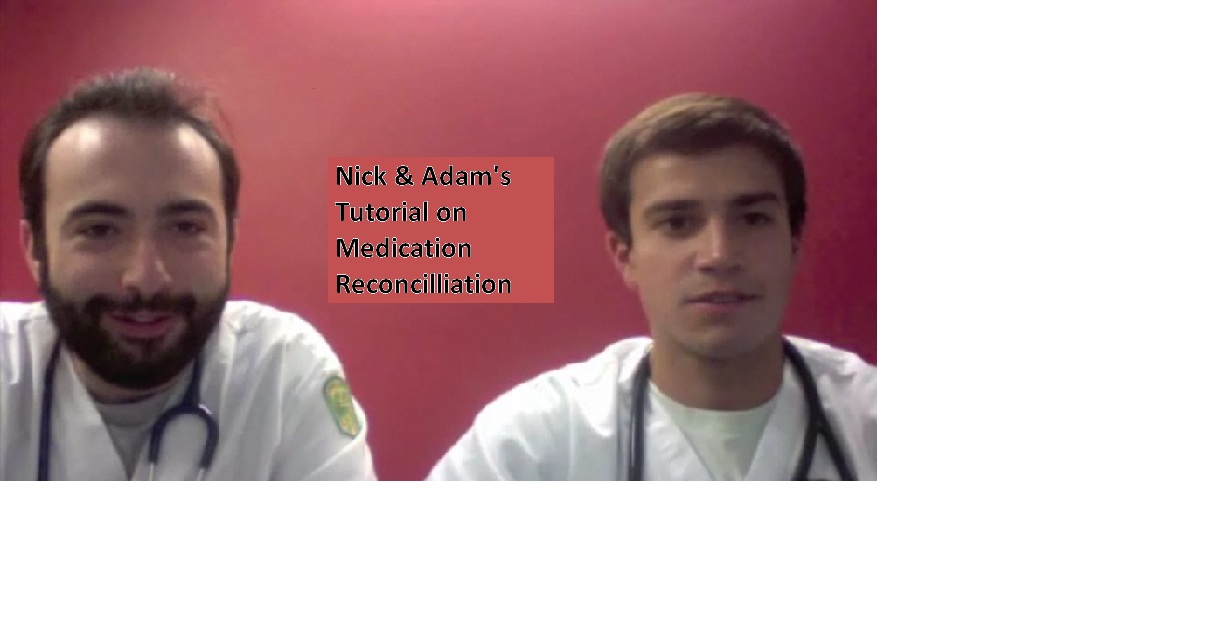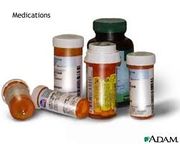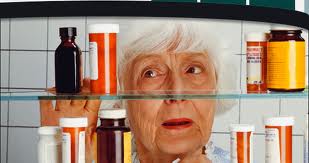Nick & Adam's Tutorial On Medication Reconciliation
Staying in good health is not easy, but remember it is a team effort. It is not just you who is looking after your health. You have a team of players who are waiting to help when the time arises. You are the captain of your health care team, and all of your health care providers are your players. In order to win the game of good health everyone must be playing on the same team. 
Contents
- 1 Student Learning
- 2 Evidence Based Facts Why Medication Reconciliation is important for you.
- 3 Things you should know about your Medications:
- 3.1 What is the name of your medication?
- 3.2 What does route mean? The route is the way in which the medication enters your body.
- 3.3 What is the dose of your Medication? The dose is the amount of drug you are taking. For each drug it is important to know exactly how much of the drug you are actually taking.
- 3.4 What time do you take your medication?
- 3.5 What is the action or purpose of the medication you are taking? Because you are putting this drug into your body, wouldn’t you like to know what it does?
- 3.6 Who prescribed it for you? Was it your Doctor, Nurse Practitioner or Physicians Assistant?
- 3.7 What is the difference between OTC (over the counter), Prescription, Supplements and Vitamins?
- 4 Why does my health care provider need to know about what OTC drugs and Vitamin/Supplements I am on?
- 5 What is medication adherence? Adherence means the patient is taking all medications as prescribed by their healthcare provider. It is important that you always consult your healthcare provider before making any changes to your medications.
Student Learning
At the end of this lesson, students will be able to:
1) Learn what Medication Reconciliation is.
2) Be able to explain why knowing the Name, Route, Dose, Time/Frequency, Action/Purpose of Medication, and who prescribed the medication to you is important.
3) Explain the difference between OTC (over the counter) Drugs, Prescriptions Drugs, and Vitamins and Supplements.
4) Define Medication Adherence and why it is important.
5) Print out a Med List and be able to fill in your Medications.
Evidence Based Facts Why Medication Reconciliation is important for you.
-Only 50% of patients take their medications correctly during the first three days after being discharged from a hospital.
-Medication errors are considered to be the 8th leading cause of death in the United States each year.-There are 1.5 million preventable medication errors per year.
-Over half of all medication errors are preventable.
-20% of geriatric patients have five or more chronic illnesses.
-20% of geriatric patients see 14 or more different doctors each year.
-The average 65 and older patient makes 40 doctor office visits each year.
-The average patient who is 65 years and older is on 9.6 prescription medications.
-Over 30% of the general population takes five or more medications.
What is Medication Reconciliation? Comparing the list of medicines the doctor has prescribed with the list of medicines the patient is actually taking.
When do you do it?
-Ideally your list should always be up to date!
-Before Doctors Visits.
-Before scheduled procedures.
Who should have the Medication List?
-You!
-Your Family (spouse, relatives, children)
-Your Caregiver(s)
-Your Health Care Providers
Things you should know about your Medications:
What is the name of your medication?
Example: Lisonopril, Lasix, metoperol, Metformin.
Reason- There are many drugs that provide the same action. Most of them however, have unique differences so it’s vital that your healthcare provider know the exact one you are taking.
What does route mean? The route is the way in which the medication enters your body.
Example: By mouth (most common), by injection, rectally, topically (cream/ointment, inhaled, eye drops, or nasal spray).
What is the dose of your Medication? The dose is the amount of drug you are taking. For each drug it is important to know exactly how much of the drug you are actually taking.
Example: One 50mg tablet per day; Two 25mg tablets per day.
Reason- If you continue to not feel well or if you are having adverse (bad) side effects, your health care provider can make the appropriate changes to your dosage and put you back on track to your goal of good health.
What time do you take your medication?
Example: Do you take your medication at night, morning, noon, every 4 hours, or on an as needed basis?
Reason- You have been prescribed to take your Medication pill once a day after you eat, however it is making you extremely drowsy and tired. If the healthcare provider knows when you are taking it, maybe they can recommend that you take your medication after dinner instead of after breakfast.
What is the action or purpose of the medication you are taking? Because you are putting this drug into your body, wouldn’t you like to know what it does?
Example- Say you are taking a medication to lower your heart rate and blood pressure. However, when you check your pulse it is only 48 beats per minute and you have been feeling light headed lately. It is possible that this drug is making your blood pressure and heart rate too low.
Reason- Remember, you are the captain of your healthcare team. If you know the basic action of the drug you are taking, you can call one of your health care players (doctor, PA, NP, or nurse) to for advice.
Who prescribed it for you? Was it your Doctor, Nurse Practitioner or Physicians Assistant?
Reason- With this information your healthcare provider can contact your other team members if and when changes need to be made. Remember, keeping yourself in good health is a team effort and everyone needs to be on the same team.
What is the difference between OTC (over the counter), Prescription, Supplements and Vitamins?
Prescription drugs: These can only be obtained with a prescription from your healthcare provider.
OTC drugs: Over the counter drugs are those that can be bought at a drugstore with no prescription needed. Examples include: Aspirin, Tylenol, and Ibuprofin.
Supplements and Vitamins: These are also available over the counter. Examples include: Daily vitamins, and Vitamin C, Calcium, and Iron supplements.
Why does my health care provider need to know about what OTC drugs and Vitamin/Supplements I am on?
Reason- OTC drugs and Vitamin/Supplements may counteract or intensify the prescription drugs that you are on. This is not always the case, but it is important for your team of healthcare providers to know if you are recruiting new players (taking OTC drugs or supplements).
What is medication adherence? Adherence means the patient is taking all medications as prescribed by their healthcare provider. It is important that you always consult your healthcare provider before making any changes to your medications.
Example- You come to your healthcare provider’s office for your annual checkup and you are known to be hypertensive (have high blood pressure). The nurse takes your blood pressure twice and the doctor does it once. If all three readings are high, the doctor is either going to want to increase the dose of your medication or put you on an additional blood pressure medication.
Reason- Prescribing too many medications could result in having too low of blood pressure, so it is important to keep track of what you are taking.
After taking this short tutorial on Medication Reconciliation you should be able to identify and explain why medication reconciliation is such a vital element in your goal of good health. I hope that you will now take the time to fill out this medication list and keep it with you at all times. Your team of healthcare providers will be thankful for what a wonderful team captain they have.
Link to Medication Reconciliation Form (please download and fill out)
Watch Our Video
English Version [n]Spanish Version [2]
Helpful Websites
Feedback
At the top of the page there is a discussion tab. Please click on the tab and give us any feedback or questions you may have. Thank you!
References
Bastable S. B. (2008). Nurse as educator: Principles of teaching and learning for nursing practice, 3rd ed. Jones and Bartlett Publishers.
Chevalier BA, Parker DD, MacKinnon NJ. et al. (2006) Nurses’ perceptions of medication safety and medication reconciliation practices. Nurs Leadersh.; 19(1), Retrieved from http://impart.pharmacy.dal.ca/Files/CJNLmedrec2006.pdf
Rozich JD, Howard RJ, Justeson JM. et al., (2004) Patient safety standardization as a mechanism to improve safety in health care. Jt Comm J Qual Saf. ;30(1), Retrieved from http://www.safetyleaders.org/Safe_Practice_Articles_NQF2006/Standardization_as_a_m echanism_to_improve_safety_in_health_care_8_14_Rozich_JCJQS_01-04.pdf
Vira T, Colquhoun M, Etchells E. (2006) Reconcilable differences: correcting medication errors at hospital admission and discharge. Qual Saf Health Care.; 15: (122), Retrieved from http://www.ncbi.nlm.nih.gov/pubmed/16585113



